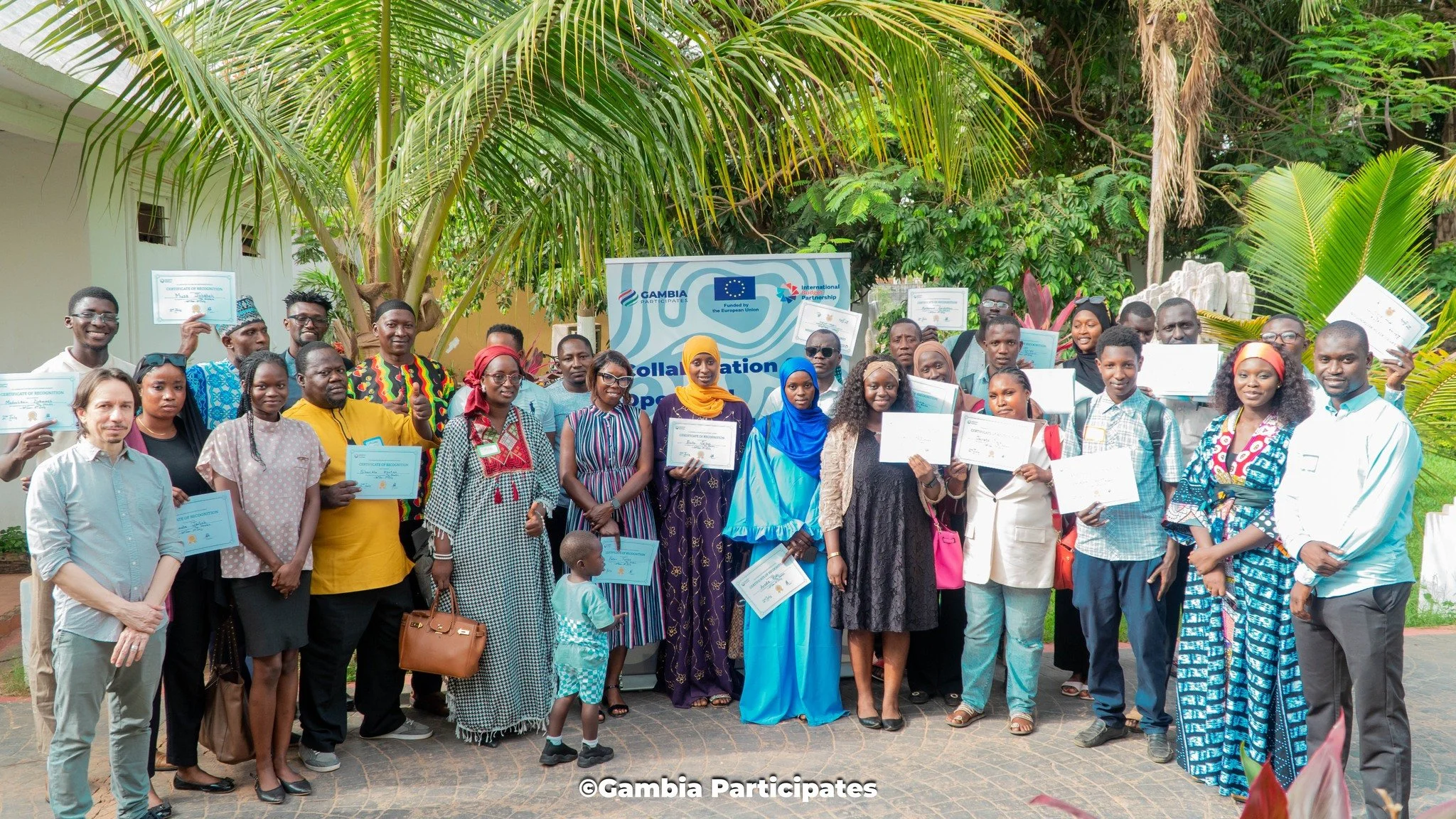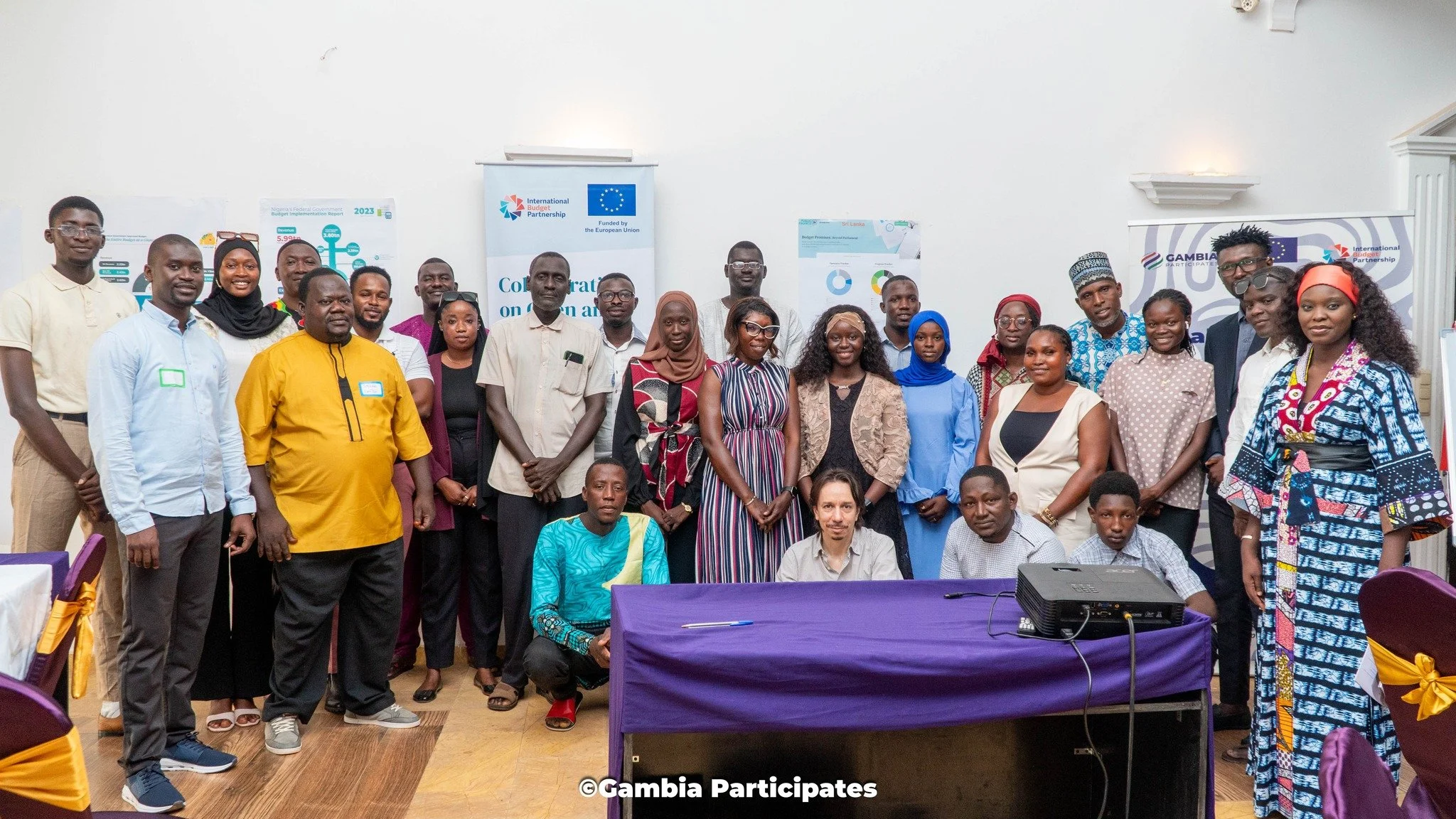From Numbers to Impact: Advocates Trained to Make Budgets Work for Education, Health, and Agriculture
Delegates and their certificates © Gambia Participates
By Fatoumata Jaiteh
In a bid to foster greater budget transparency and more effective resource allocation, Gambia Participates, in collaboration with the International Budget Partnership (IBP), organized a three-day learning workshop on budget implementation from June 30th to July 2nd, 2025, at the Coconut Residence in Kololi. The training forms part of the European Union-funded initiative, Collaborating for Open and Accountable Budgeting (CoAB).
The workshop brought together a diverse group of stakeholders—including civil society organizations, agriculturalists, educators, economists, and journalists—with the aim of deepening their understanding of budget processes, particularly the implementation phase, and equipping them with the tools to actively monitor and engage in public spending.
At its core, the workshop sought to ensure that participants, especially those in advocacy, governance, and service delivery sectors, are well-versed in how government budgets are executed. This includes understanding how funds are released, spent, recorded, and reported. By strengthening this capacity, the initiative aims to empower organizations to hold duty-bearers accountable, demand transparency, and advocate for more equitable and effective allocation of public resources—particularly in essential sectors like education, agriculture, and healthcare.
Day One: Understanding Budget Execution
The opening day featured interactive sessions designed to foster connection and collaboration among participants, many of whom were meeting for the first time. Guided discussions and icebreakers helped lay the foundation for a spirit of partnership—crucial for meaningful civic engagement.
Facilitators introduced the fundamentals of budget implementation, breaking it down into five key components:
Release of funds to Ministries, Departments, and Agencies (MDAs)
Initiation of spending
Payment for goods and services
Recording of transactions
Production of accounting and budget reports
Participants also reviewed key documents required to track and analyze budget execution, including the Enacted Budget, In-Year Reports, Year-End Reports, and Supplementary Budgets.
A particularly lively discussion emerged around supplementary budgets. One participant questioned the legality of deviating from an approved budget. In response, Marr Nyang, Executive Director of Gambia Participates, explained that Gambian laws focus more on overspending than underspending, citing emergency expenditures during the COVID-19 pandemic as an example.
Asiatou, a lead trainer, added that performance reports should serve as the basis for any budgetary deviation. “Budget deviation is not always bad,” she noted, “but the explanation for the deviation is very important.” She emphasized that, although sometimes justified, deviations often stem from corruption or mismanagement.
Kebba AF Touray, a journalist with Foroyaa Newspaper, stressed the critical role of the media in ensuring budget accountability. “The media must act as a watchdog,” he said, “ensuring that deviations from the approved budget are scrutinized and brought to public attention.”
Participants also examined the role of oversight institutions, including the National Assembly and the Supreme Audit Institution (SAI). Many noted that corruption thrives in the absence of effective oversight, highlighting SAI reports as vital tools for identifying irregularities and promoting accountability.
One participant raised concerns about the imbalance between recurrent and development budgets, noting that the government often prioritizes recurrent expenditures at the expense of long-term investments. This, they argued, hinders national development and social progress.
On the topic of debt servicing, Marr Nyang offered a sobering perspective. “Sometimes when the government builds roads or launches infrastructure projects, citizens celebrate,” he said. “But ironically, these projects are often financed through loans—and the same funds we celebrate are used to pay off debts.” His comments underscored the need for greater public awareness of the true cost of government spending.
Mr. Nyang concluded by encouraging participants to approach the national budget with a critical lens: “Each time we open the budget, the figures we see should trigger a question that needs an answer in our area of advocacy.”
Trainers at the Workshop © Gambia Participates
Day Two: Accessing and Analyzing Budget Data
The second day focused on how to find and access budget information, a critical skill for civic engagement and public accountability. Participants were introduced to practical tools to solve budget-related challenges, including:
Analyzing data to understand fund allocation and expenditure
Requesting information from public authorities
Generating independent data when government data is unavailable or insufficient
By learning how to access, interpret, and use budget data, participants are now better equipped to demand transparency, advocate for fairness, and contribute meaningfully to public finance discussions.
Day Three: Dialogue with the Budget Director
The final day featured a rare and open dialogue with Mr. Mustapha Samateh, Director of Budget at the Ministry of Finance. His session offered participants the opportunity to ask pressing questions about budget implementation challenges.
Mr. Samateh underscored the importance of the national budget, stating, “Besides the Constitution, the budget is the most important document. Every citizen has a stake in it.”
When asked about the lack of visibility of State-Owned Enterprises (SOEs) in the national budget, Mr. Samateh clarified, “SOEs are captured. The only question is their added value.”
Responding to concerns about late disbursement of funds, he explained, “You can’t give what you don’t have. If budget support comes late, we rely on collections by the Gambia Revenue Authority.” He added, “Sometimes what you plan and the reality on the ground are completely different.”
Another critical issue raised was the continued allocation of funds to recurrent expenditures with limited impact, while development budgets remain underfunded. Mr. Samateh acknowledged the systemic nature of the issue: “This system has been there for posterity. The only way it can change is through constitutional reform.”
He also noted, “We don't have a say in the budget proposals brought to us. Our role is to ensure that ministries and departments align their proposals with the National Development Plan.”
The workshop concluded with hands-on exercises, presentations, and group discussions designed to build a stronger network of budget-literate citizens committed to promoting transparency and demanding accountability in public finance management.
Delegates in training © Gambia Participates



